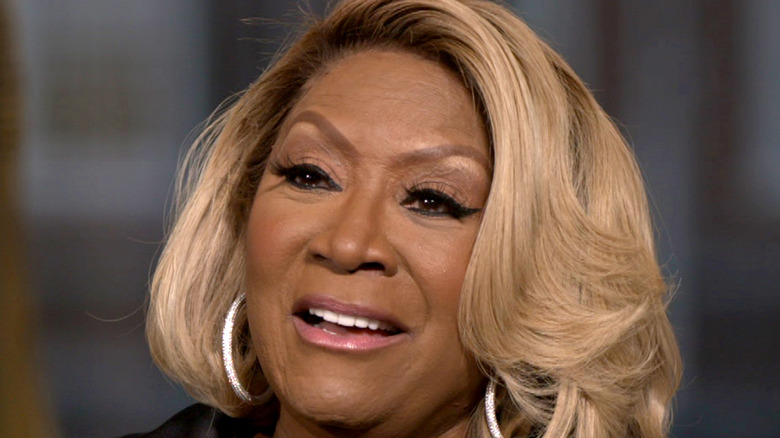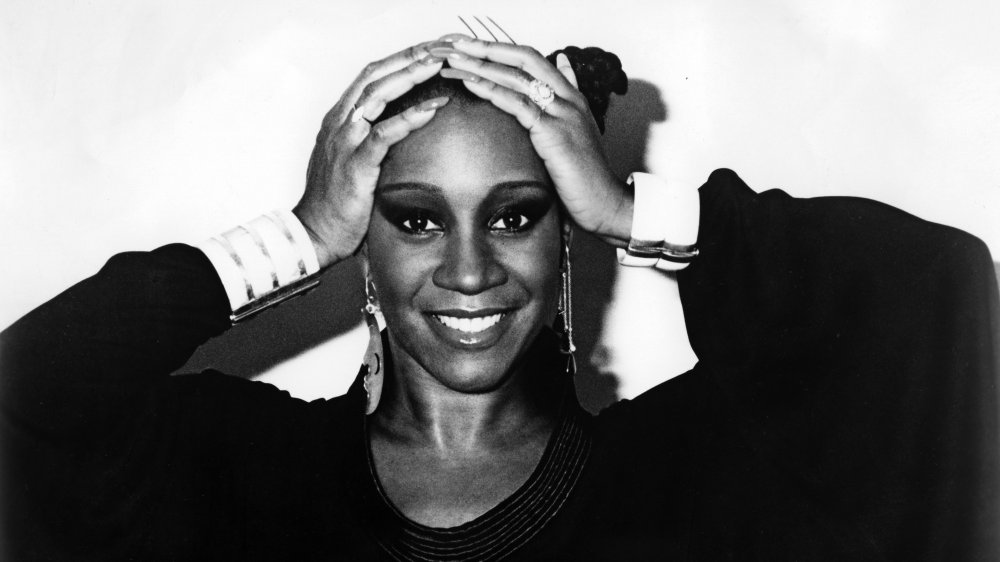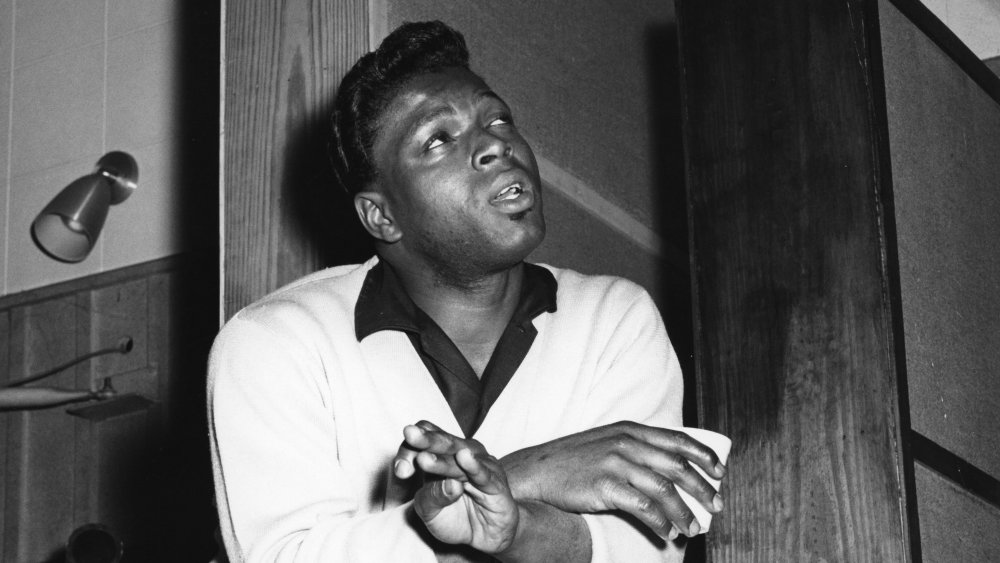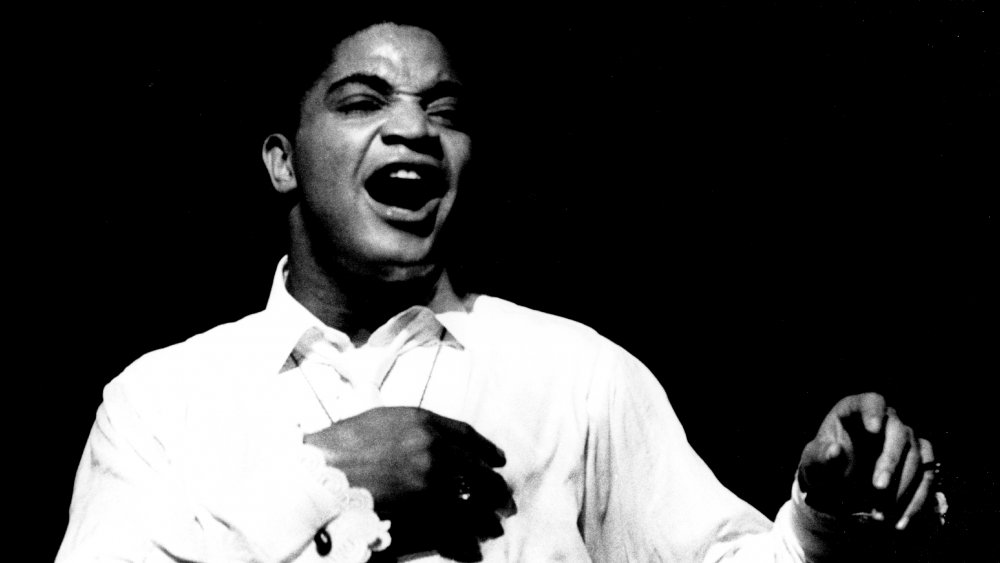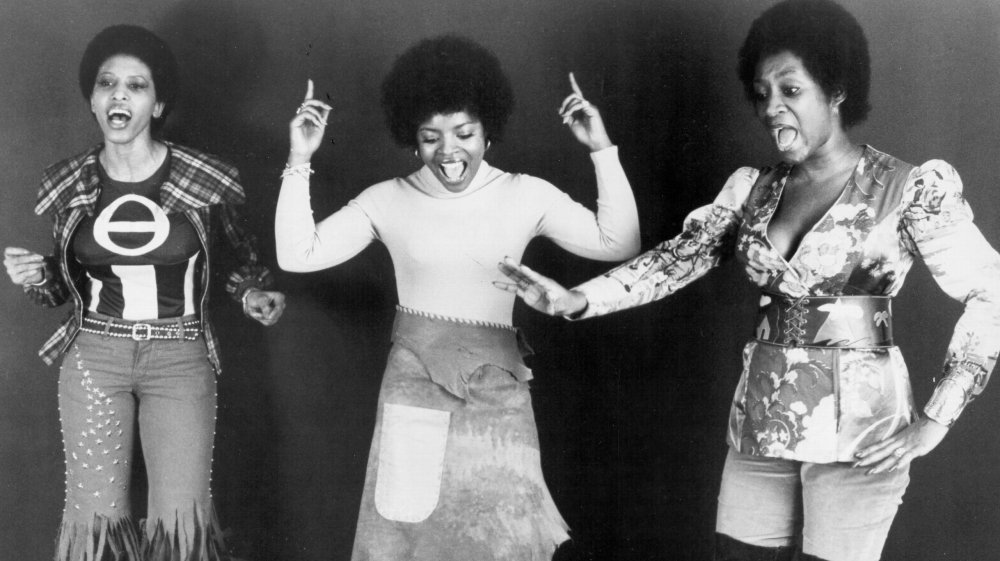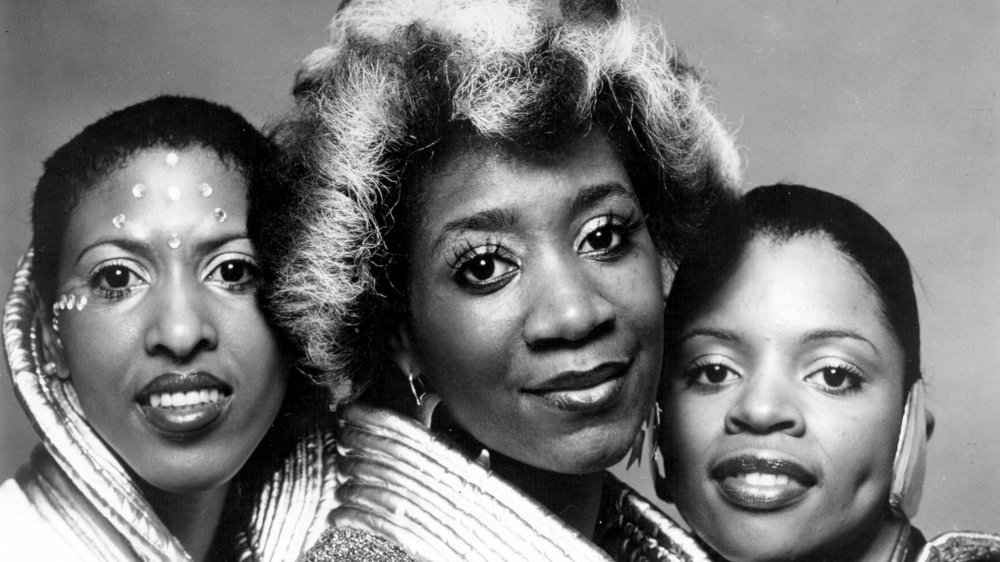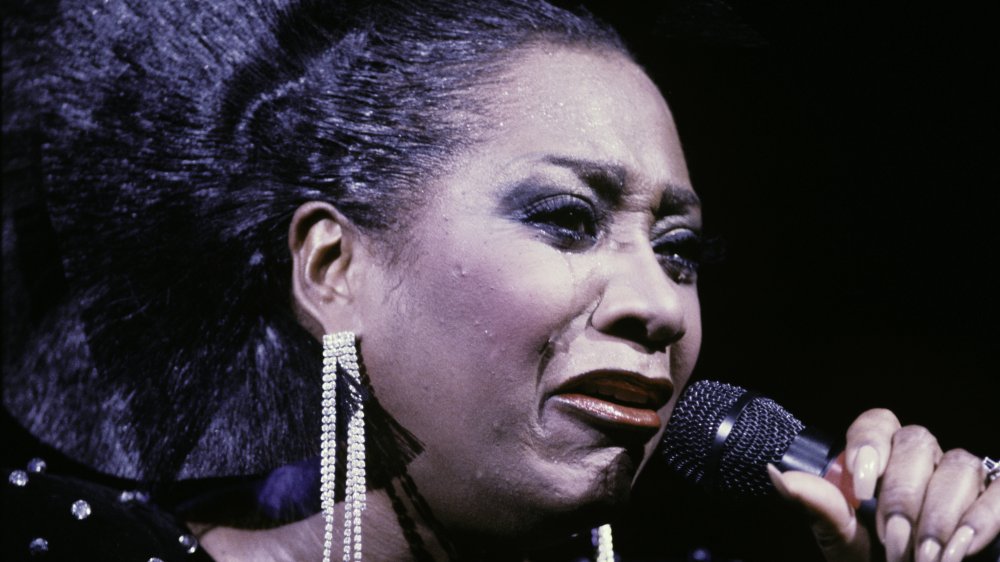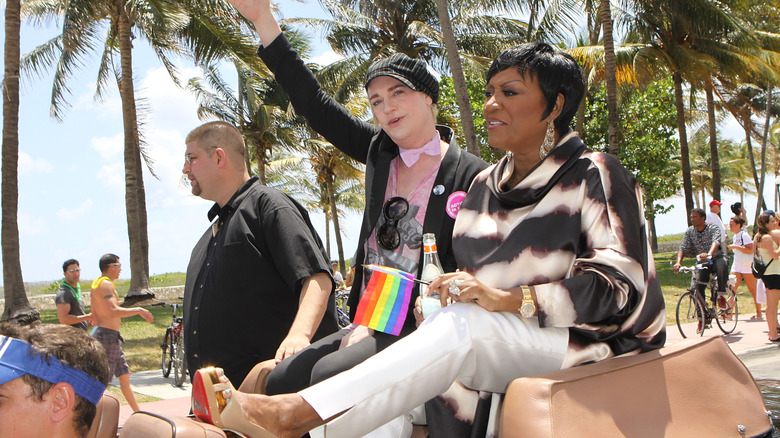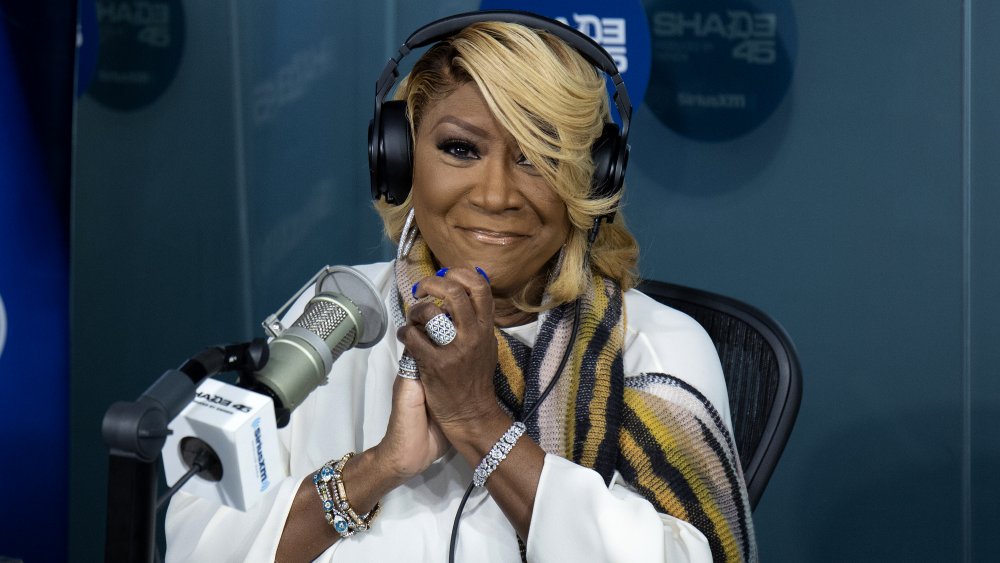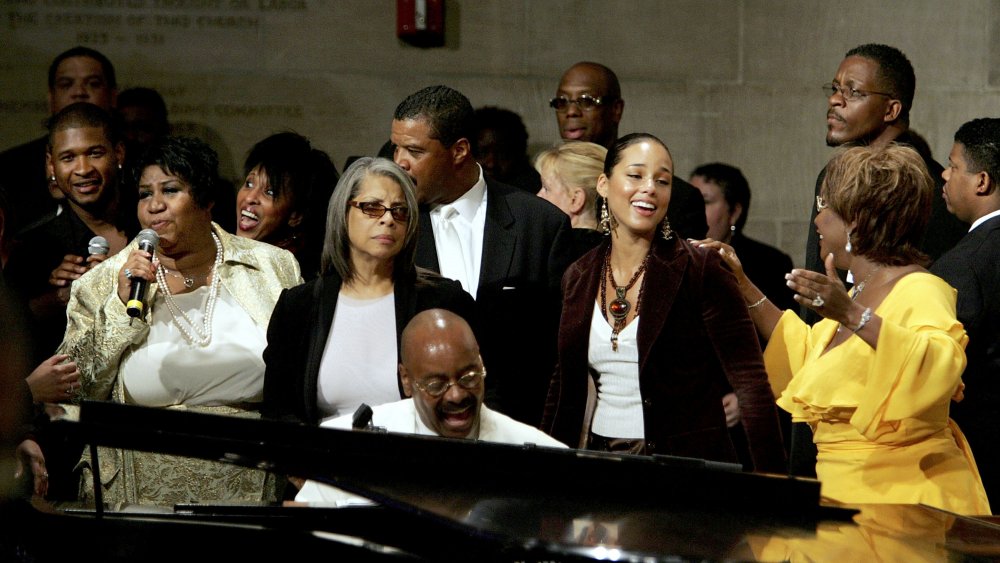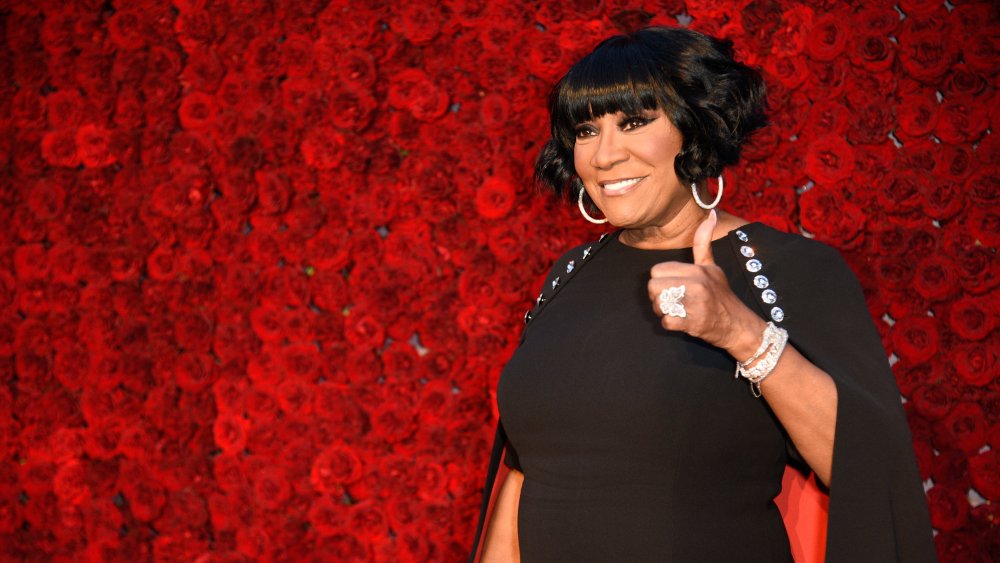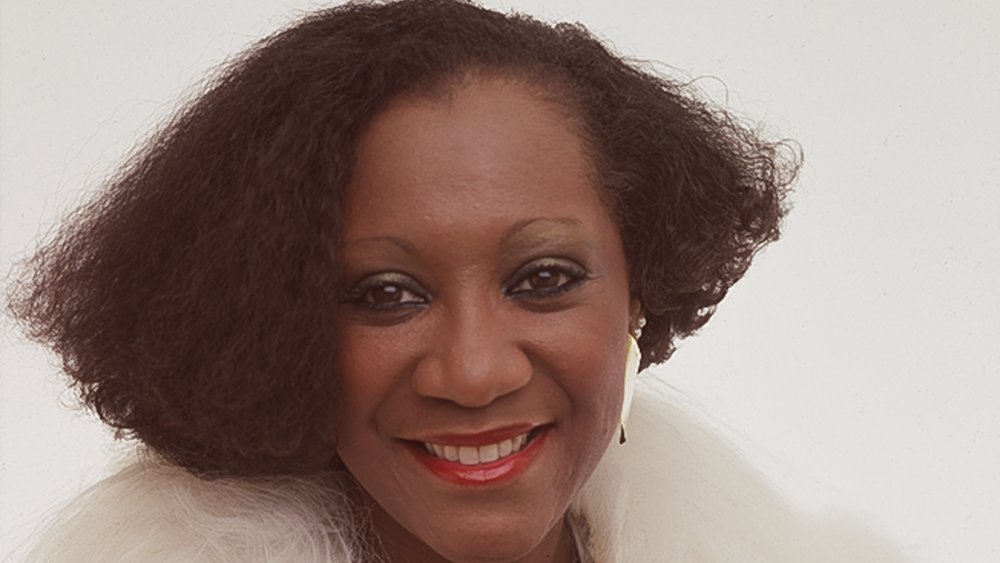The Tragic Real-Life Story Of Patti LaBelle
Okay, show of hands, who doesn't get a Patti Sweet Potato pie every holiday season? Sure, Sean Combs and 50 Cent have been able to launch products in the food and drink industry after finding success in the music industry, and musicians such as Beyoncé and Jennifer Hudson have been able to take to Broadway and film after beginning in music. But before all of them, there was the woman dubbed the "Godmother of Soul," Patti LaBelle. Before Philadelphia became the epicenter of soul music in the 1970s, Patti LaBelle and her band, LaBelle, were putting the City of Brotherly Love on the music map and infusing soul, rock, and early disco into a successful musical act. After going solo, she found even more success in and outside of music. With cookbooks, acting, and various entrepreneurial side projects, LaBelle has cemented herself as an institution.
This was not always the case for LaBelle. For every success, there was a failure, and for every accomplishment, there was a loss, either personally or professionally. LaBelle has taken a number of hits in her almost eight decades on the planet and has still come out on top. Here is the tragic real-life story of Patti LaBelle.
She suffered abuse growing up
Patti LaBelle was born Patricia Louise Holt on May 24, 1944, in Philadelphia, Pennsylvania, to Henry Holt, a railroad worker and nightclub singer, and Bertha Holt. Despite living in relative economic comfort, LaBelle's life and childhood were far from comfortable. At the age of 12, according to her autobiography, "Don't Block the Blessings," her parents separated after her mother suffered years of abuse. Despite this, LaBelle kept in close contact with her father until his passing.
In a documentary about the singer, LaBelle, who was referred to as "Patsy" growing up, was described as "timid and quiet." LaBelle herself did not expect to be a singer, as she discussed in the documentary: "I thought I was going to be a housewife. I was very shy and introverted, and whatever I had inside did not come out very much then." Following her parents' divorce, LaBelle would have to overcome another emotional scar after she was assaulted by a family friend, an event she would not speak of for a long time.
LaBelle said that her church became both a safe place and somewhere to mature musically. According to Black Past, in high school, LaBelle, her older sister, and three friends formed a singing group, though they broke up after one show because of fighting between the sisters. Throughout high school, LaBelle would continue to sing in a group named the Ordettes.
Patti LaBelle's engagement to Otis Williams
In her final semester of high school, Patti LaBelle dropped out to tour with her group, now managed by Bernand Montague. Over the next few years, LaBelle would tour and build up a small following. However, the young frontwoman's life could have taken a drastic turn, thanks to an infatuation with another rising star singer.
Long before Beyoncé and Jay Z and Ashford and Simpson, there was Otis Williams and Patti LaBelle. In the early 1960s, LaBelle was a rising singer in Philadelphia when she met Otis Williams, a member of one of the most popular groups in the country, The Temptations, when the Motown group came to her Philadelphia hometown for a show. According to HuffPost, the two singers met after the show, and their courtship began soon after. The courtship was intense, though LaBelle herself, looking back on the relationship, wondered whether she was attracted to Williams himself or if she was just starstruck by his spot in The Temptations.
Williams soon asked for her hand in marriage, but it was at this point that LaBelle ended the relationship. According to her autobiography, "Don't Block the Blessings," Williams wanted LaBelle to move away from Philadelphia to his home in California and slow down her music career so they could focus on their marriage. LaBelle turned down Williams' proposal, saying she could not give up her music, something he understood. The pair remained close friends throughout the years as their two careers continued to rise.
Her accusation against Jackie Wilson
Jackie Wilson was one of the greatest performers of the 1950s and '60s. Nicknamed "Mr. Excitement" and listed at No. 69 on Rolling Stone's 100 Greatest Artists list, Wilson holds a legacy as one of music history's all-time greatest entertainers. However, like many musicians, there was a dark side to Wilson.
In her autobiography "Don't Block the Blessings," Patti LaBelle recalled a disturbing incident in the early 1960s when she was still an up-and-comer in the music world, and Wilson was a solidified star. While alone backstage at a theater in Brooklyn, LaBelle said a man came up from behind and started to kiss her neck. The man, it turned out, was Jackie Wilson, and, according to the Michigan Chronicle, LaBelle remembered smelling liquor on his breath. Wilson and an associate then allegedly grabbed LaBelle and attempted to carry her into a locked room. LaBelle recalled not having a weapon and wasn't strong enough to fight the two men off, but she screamed loud enough to make them let her go, allowing her to escape.
Wilson, according to Jerry Reuss, was known for having a short temper and had a number of extramarital affairs. During the early 1960s, Wilson was married to his childhood sweetheart, Freda Hood. Gladys Knight, friend to both LaBelle and the late Wilson, did not deny LaBelle's accusations, though she said Wilson was very supportive and helped her career along when she was a young musician (via the Michigan Chronicle).
Her early career troubles
No musician starts at the top. Typically, it takes years of struggle, practice, and finding the right lineup before a performer can even start to get the slightest amount of commercial success. Patti LaBelle is no different in this regard.
Once they dropped out of high school, the Ordettes toured the East Coast. According to John Clemente's book, "Girl Groups: Fabulous Females Who Rocked the World," LaBelle and her bandmates Sarah Dash, Nona Hendryx, and Cindy Birdsong performed every day at different venues. Finally, as told by Pop Dose, their big break came in 1962 and involved a cover of the song "I Sold My Heart to a Junkman."
Harold B. Robinson, a car dealer attempting to launch his own label, had approached another girl group, the Starlets, and convinced them to record the song. Despite the group telling Robinson they were a part of another label, he convinced them it would not be an issue, and they capitulated. When Robinson's Newton Records finally launched later that year, he released the track, credited to "The Blue Belles." Then he had the Ordettes, unaware of the previous recording with the Starlets, record the song during an audition. As the song began to climb in popularity, the Starlets' manager sued Robinson, with the newly named Patti LaBelle and the Blue Belles stuck in the middle.
The end of LaBelle
Following the episode with the Starlets and Harold Robinson, the Blue Belles spent the next few years fluctuating between success and failure. According to VH1, the group recorded a number of top 40 hits before jumping ship to Atlantic Records in 1965. During their three years with Atlantic, however, the group struggled to reach similar success, and by the end, Cindy Birdsong had left the group to replace Florence Ballard in the Supremes.
In 1970, the Blue Belles began to be managed by British television producer Vicki Wickman. Wickman renamed them "LaBelle" and pushed the group toward the increasingly popular glitter rock aesthetic. This change helped push the women to the greatest critical and commercial success of their careers, eventually nabbing their first Billboard No. 1 single with the song "Lady Marmalade." According to her autobiography "Don't Block the Blessings," LaBelle was the first Black pop act to play the Metropolitan Opera House, and, as per the Press Herald, the first Black vocal group to grace the cover of Rolling Stone and the first.
Despite being critically acclaimed, by the middle of the 1970s, the group was nearing the end. The issue was the different musical views between the three women. Patti LaBelle wanted to return to soul ballads, Nona Hendryx favored glam rock, and Sarah Dash preferred disco. During a December show in 1976, Hendryx left the stage before their final number and suffered a mental breakdown. Hendryx was taken to the hospital, and the trio agreed to end the group.
Failure after Patti Labelle's first solo album
After LaBelle broke up, it was easy to assume that Patti LaBelle would be the breakout star. She was the main vocalist, the band was named after her, and her first album outside the group was a hit. Unfortunately, it would be a few years and albums before Patti LaBelle would reach that same success. According to Biography, Patti's first solo album, "Patti LaBelle," was a critical success and included the singles "Joy To Have Your Love," "Dan Swit Me," and "You Are My Friend."
While "Patti LaBelle" set the foundation for a successful career, Patti's subsequent efforts didn't pan out. Her next three albums, "Tasty," "It's Alright with Me," and "Released," failed to achieve the same success as her later years with LaBelle or her first solo album. In 1981, she left Epic Records and signed with Philadelphia International Records. After another album, she took her interest to Broadway.
However, Patti LaBelle never completely left music. In 1983, while still performing on Broadway, she recorded her own version of the ballad "The Best is Yet to Come." The same year, she recorded the song "If Only God Knew" as well as the album "I'm In Love Again," which broke her streak of unsuccessful album releases. "I'm In Love Again" peaked at No. 46 on Billboard and achieved gold status, selling over half a million copies. This would be the beginning of a very successful decade for Patti LaBelle.
Patti LaBelle's lifelong commitment to the fight against HIV/AIDS
In Caly Cane's work, "Live Through This: Surviving the Intersections of Sexuality, God, and Race," she refers to Patti LaBelle as "arguably the greatest gay icon of all time and a prime example of the intersection of the LGBT community and black female artists," despite the fact that LaBelle is heterosexual and was closely involved with her church growing up. All the same, LaBelle's music and dedication toward the LGBT community has been cemented for half a century.
LaBelle discussed her closeness with the LGBT community in an interview with the New York Post, saying, "I'm very vocal about speaking my mind when I see injustice. ... Sometimes gay men and ladies are afraid to come out and say what they really feel, so I think I'm a voice for some of my children." One contemporary who was scared to come out was the late singer Luther Vandross. During an interview on "Watch What Happens Live," she said that Vandross confided in her his desire to come out, but he feared scorn from his mother and female fans.
During the height of the HIV/AIDS epidemic that spread like wildfire through both the LGBT and Black communities, LaBelle was an outspoken advocate for awareness and testing. The National Library of Medicine reports that in 1987, LaBelle became the spokeswoman for the National Minority AIDS Council and promoted the "Live Long, Sugar" campaign that sought to encourage people of color to get treatment.
Her marriage to Armstead Edwards
Prior to their marriage, Armstead Edwards was Patti LaBelle's manager. According to the Huffington Post, LaBelle turned down Edwards' proposals three times before she proposed to him: "[He] asked me to marry him three times, and I said no. The fourth time, I asked him."
In 1969, the pair were married, and four years later, LaBelle gave birth to their son, Zuri. They raised Zuri, as well as adopted the two children of her late sister Jacqueline and the two children of their neighbor, according to AARP. However, the pair's romance did not last forever.
After more than three decades of marriage, the pair announced they were separating in 2000 and officially divorced three years later. Despite how messy divorces can be, LaBelle said theirs wasn't. According to Country Living, she said this about why she and Edwards divorced: "I never hated him. He never hated me, We just couldn't live together ... We never fought, thank God, in 32 years. We got along even when we didn't get along."
Edwards and LaBelle both remain close as they care for their large family. LaBelle still refers to her ex-husband as one of her best friends. In a post on Instagram (via I Love Old School Music), she and Edwards reunited in May 2019 to celebrate his birthday with their family, showing that the pair still care for each other, even if it's now as friends instead of as a couple.
Lawsuits against Patti LaBelle
After the Harold Robinson controversy early in her career, Patti LaBelle's record for avoiding lawsuits and controversies was spotless throughout the rest of the century. However, trouble has seemed to follow LaBelle into the turn of the 21st century. Maybe she has been living up to her diva name, or maybe it's a case of being in the wrong place at the wrong time, but multiple lawsuits have been filed against Patti LaBelle or her associates in recent years.
For years, there were rumors that LaBelle was in a feud with fellow singer Aretha Franklin. It made for great tabloid speculation: "The Queen of Soul" in Franklin versus "The Godmother of Soul" in LaBelle. However, according to the HuffPost, the two denied ever feuding, and when Franklin passed away in 2018, Franklin wanted her former friend to sing at her memorial service, as per The Philadelphia Tribune.
Rumors aside, LaBelle and her team have seen the inside of a courthouse over the past decade. In 2010, CNN reported that LaBelle paid a $100,000 settlement for a 2008 incident in which she allegedly verbally and physically assaulted a mother and her 18-month-old child. The complainant accused the singer of "yelling, screaming obscenities, throwing water and drenching with water, [and] attempting to strike and physically injure" the woman in a Manhattan lobby. LaBelle and her team denied the accusation. In 2011, LaBelle was sued when her security guards concussed a West Point cadet after he walked close to their limousine, according to ABC News. In 2014, a jury sided in favor of LaBelle's security guards; she had been dropped from the lawsuit previously, reports The Seattle Times.
Losing family members
While Patti LaBelle has found success in her career, both inside and outside the music industry, she's had to make this journey, for the most part, without her family being able to see her continued success. All three of LaBelle's sisters tragically died of cancer died before hitting 50 years old.
According to her book, "Don't Block the Blessings," her eldest sister, Vivian Hogan Rodgers, was the first to pass away, dying of lung cancer when she was 43. Following was her sister Barbara Holte Purifoy, who was a member of LaBelle's first singing group. She died of colon cancer at 40. After that, her youngest sister, Jacqueline Holte-Padgett, died of brain cancer at age 43.
The death of her youngest sister hit LaBelle the hardest because of an unfulfilled request she had made. In an interview on Oprah's Master Class, LaBelle said she talked to her youngest sister the day before she passed. Her sick sister asked her to make her an egg sandwich, which LaBelle said she would do the next day. Unfortunately, her sister passed away the following day before the two could see each other. LaBelle said the moment still haunts her.
During the years she lost her sisters, Patti LaBelle's parents also passed away — her father of Alzheimer's and her mother of diabetes. Her mother's death was especially poignant, as LaBelle herself would become diabetic.
Battling Diabetes
Like her mother, Patti LaBelle was diagnosed with diabetes. According to Diabetes.co.uk, LaBelle passed out during a 1995 performance in New York. Upon waking up, her doctor told her she had type 2 diabetes. By her own admission, LaBelle was angry upon learning about the diagnosis. According to Black Doctor, diabetes runs in her family, taking not only her mother but also her aunt and grandmother. However, like any other obstacle, LaBelle adjusted and has come out the other side stronger.
LaBelle adopted a regular exercise routine with her personal trainer, wrote cookbooks, and created a series of sauces called "Patti's Good Life." Similar to her work for HIV/AIDS awareness, she became a spokesperson for diabetes awareness. LaBelle is a member of the American Diabetes Association's Celebrity Cabinet and a spokesperson for Glucerna's Diabetes Freedom Campaign.
When asked by ABC News about her lifestyle following the diagnosis, the entrepreneur had this to say: "I carry my pots and pans on the road with me to make sure I'm eating the proper foods because if I cook it, I know what's in it." While she admitted that giving up certain foods was difficult, seeing firsthand what the disease does was enough motivation. "My mother had amputations and my aunt, she became blind," she said. "It was easy because I wanted to live." LaBelle said the key is to "live your best life," something she is very familiar with.
